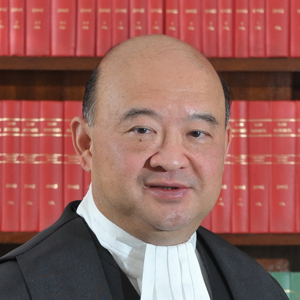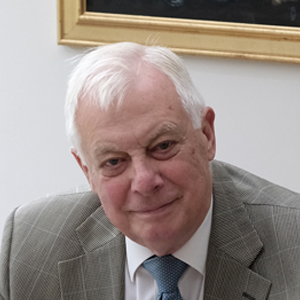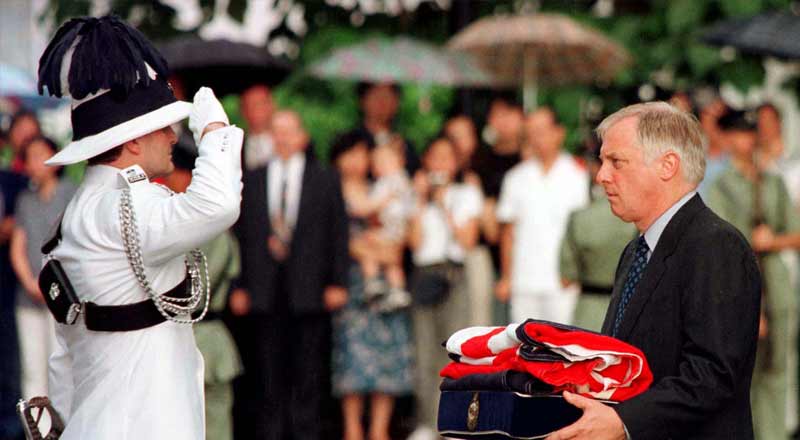A conversation with…
The Honourable Chief Justice Geoffrey Ma Tao-Li, GBM QC SC
The Honourable Chief Justice Geoffrey Ma Tao-Li, GBM QC SC was appointed Justice of Appeal in the Hong Kong Court of Appeal in 2002, and became Chief Judge of the High Court in 2003 before being appointed Chief Justice of the Court of Final Appeal in 2010. Chief Justice Ma spoke to the IBA’s Director of Content, James Lewis, about freedom of expression in Hong Kong, the independence of the judiciary, and the drafting and enforcement of the national security law.
James Lewis: The national security law has been brought in under very specific circumstances – there was widespread, and quite extreme, unrest on the streets and protests. Will the law achieve what presumably it is setting out to do, which is to end the protests?

Chief Justice Geoffrey Ma: I mean, there certainly have been fewer protests going on in Hong Kong. Whether that's due to the national security law or indeed anything else is open to conjecture.
All I can say is that when the law comes to be dealt with by the courts, there are issues which can arise, and which have arisen, and which will have to be determined by the courts. The message I'm trying to get across is that the courts, in dealing with the national security law, are not going to be any different in approach than in any other case. It's going to be the same.
JL: Was the basic law and the powers of the Hong Kong judiciary sufficient to deal with the extreme nature of the protests that flowed from the imposition of the extradition law?
GM: We are dealing with protests and the criminal cases which have come from it. And there are quite a number of those. Dealing with offences ranging from unlawful assembly through to assault, murder, attempted murder, rioting and so on.
And then you've got to look at these cases to see whether there are defences open on various bases or when, if guilt is established, it is relevant to look at the motive. The motive being, for example, to demonstrate and so on and so forth.
JL: Do you feel there was sufficient consultation before the national security law was imposed on Hong Kong?
GM: Well, I mean, the laws are not done in consultation with the judiciary. But in terms of the political [consultation], the national security law didn't go through the Legislative Council. That's not really a matter I can comment on. I mean, I know that's the controversy, that this is a law which didn't go to the legislature, and probably would not go through the legislature, but not really a matter for me to answer.
“The laws are not done in consultation with the judiciary. But in terms of the political [consultation], the national security law didn't go through the Legislative Council
JL: Is that not a key point, though, in terms of rule of law, the autonomy of Hong Kong and issues of separation of powers?
GM: Well, in terms of the various functions under the basic law of various entities, such as the executive, the legislature and the judiciary, those [functions] are set out in the basic law, and if somebody wants to raise a point on it, I suppose they can. In fact, these are issues which have been ventilated before the courts and we'll be dealing with that very issue probably in a couple of weeks’ time, not in relation to national security, however.
JL: There was some shock when the national security law was imposed, and some of the commentary reflects that and has described the imposition of the national security law as the end of Hong Kong and an end to one country, two systems. I was going to ask if you agree with that, but I suspect you don’t, so I'll ask your views on that sort of commentary that we're reading in Western media.
GM: I mean, insofar as what is referred to, is that it is a legal statement, so that the national security law will mean the end of the legal system as we know it in Hong Kong. It also means that judges are not going to be able to discharge their constitutional responsibilities as before. Or if what is meant is that ‘are the rights and freedoms which are guaranteed and stipulated in the basic law and then the ICCPR (International Covenant on Civil and Political Rights) go out of the window?’, then I disagree with that, because until that happens…it hasn't happened, but it’s hard to see what the basis for saying that is. Insofar as it comes from a political point of view, I can’t comment on that.
JL: Specifically on the law and the drafting of it – there's been some concern voiced about the significance that the national security law was drafted in Chinese only. And as I understand it, the 160 articles of the basic law have an authentic English translation, which lends itself to transparency and openness when the courts are interpreting. What's your view on how problematic it is that there's no authentic English translation?
GM: Well, this is, of course, where the interface between Hong Kong and the mainland comes into play. As far as the mainland is concerned, the laws which are passed in the mainland will be only in Chinese, for obvious reasons. In the same way that UK laws are drafted in English as opposed to laws being drafted in, say, German.
Now, in Hong Kong, things are a little different because of the difference in the system. In Hong Kong, there are two official languages and the two official languages are English and Chinese, which means that all laws which exist in Hong Kong and are passed by the legislature will have to be bilingual. Now, in the case of the national security law, this is a law which applies to Hong Kong only. Obviously, it's tailor-made for Hong Kong. There is no official English translation, I think, but there obviously should be an English translation because people, lawyers, judges and so on are going to have to adjudicate on this.
So, whatever the rights and wrongs of not having an original English translation, the reality is that by the time these matters get to the courts, there must be people working on an English translation of it. Obviously, if there's going to be a dispute between the English [translation] and the Chinese [legislature], the Chinese [version] is likely to take precedence over this. But these are arguments which we've had in the Hong Kong courts. We've had many of these over the years. We have really yet to see one case in which, you know, the term put in one language or the other makes that much of a difference. But I suspect that the issues which may arise under the national security law are not going to be issues created by difficulties in whether they use English or Chinese.
“I suspect that the issues which may arise under the national security law are not going to be issues created by difficulties in whether they use English or Chinese
JL: The national security law was imposed, as I've said, largely in response to protests arising from the extradition law, which became democracy protests. As I understand it, the streets are much quieter now in Hong Kong. Do we interpret that as meaning that the national security law has really stymied free expression and the people's feeling that they can protest? Has it curtailed people's rights, particularly freedom of expression?
GM: Well, this, again, is purely a matter of conjecture if you get past the political rhetoric and look to the legal basis for what you've just said. It's difficult to see, or rather it's just difficult to know, what the reason is. And we were, of course, in the middle of the Covid-19 pandemic as well. So, people will give, I think, their interpretation based usually on, I guess, political viewpoints.
JL: Do you see any significance in the arrest of media owner Jimmy Lai earlier this year?
GM: Well, that's a matter for the court. So, no comment on that. I'll deal with one aspect of arrests happening in Hong Kong, which is that very often these days, judges and the judiciary are criticised by groups following results, particularly in criminal cases. In criminal cases, you have one of two results. You have an acquittal or you have a conviction. And depending on whether there's been a conviction or an acquittal, particularly arising from the cases involving protests which have a political origin, people on one side or the other side of the political divide will be criticising the courts or praising it.
One side saying this is the end of the rule of law. The other side saying it's great for the rule of law. But at the end of it, people are just looking at the result that they want. If they are unhappy with it, they criticise the courts. And this form of criticism has occurred in Hong Kong, particularly in recent times.
“One side saying this is the end of the rule of law. The other side saying it's great for the rule of law. But at the end of it, people are just looking at the result that they want
But, you know, in terms of criticising the courts, my message has been: criticise when you have a basis to do so, other than just the result. You've got to have some grounds to criticise the judges on. The basis of the usual criticisms is that the judges are biased, or politically biased. So, these are serious accusations to make. And these are obviously of some concern because they make an assertion that the judiciary or some members of the judiciary are biased. And that is, of course, the opposite of what the rule of law stands for and what the independence of the judiciary stands for.
This is an abridged version of a longer interview, which is available on the IBA website.
A conversation with… Rt Hon Lord Chris Patten of Barnes CH
Lord Patten’s career has spanned over 50 years in public service, including as the UK Secretary of State for the Environment, the Chairman of the UK’s Conservative Party and the last British governor of Hong Kong. He spoke to the IBA’s Executive Director, Mark Ellis.
Mark Ellis: I don't want to be presumptuous, but I'm guessing that you are pleased with the way the US elections went?

Chris Patten: I've watched what's happened in the US with disbelief and consternation. Consternation because of the image which America, at this time, is unfortunately giving to the world. We should all be aware of the extent to which attacks on liberal democracy are one thing, but what is indefensible is when people in liberal democracies undermine the case for an open society. And disbelief, as I couldn't imagine that anybody in a democracy, in a closely fought and very vigorous election, could behave like this.
“What is indefensible is when people in liberal democracies undermine the case for an open society
President Trump isn't my cup of tea, but he's obviously a formidable campaigner. And the fact that he was able to attract so many votes with that sort of brand of crazy populism is astonishing. So, the good thing that’s come out of this is the way that President-elect Biden and his Vice President-elect, Kamala Harris, behaved with extraordinary dignity in the circumstances.
ME: You’ve mentioned Mr Trump's ability to galvanise people on a populist agenda. It seems that agenda had a basis, that there was a deep divide prior to his election, and there certainly is one now. How would President Biden deal with these kinds of underlying, fundamental issues that seem to have created what’s almost a permanent division?
CP: Former Vice President Biden has, in the past, really made his name with the ability to create consensus. I just hope he's able to do that with Senator McConnell and others. If the Republican leadership in the Senate sets out to destroy Biden in the way that they did with President Obama, then we're all going to be terrible losers, including, in the long run, Republicans, but particularly including all those of us who are worried about the reputation of liberal democracy.
ME: Currently, Hong Kong is central to the concerns of the international community and there's no-one better to talk about it than you. It's the youth that are really driving the pro-democracy movement. You say it is a belief in pluralism under the rule of law and enthusiasm for accountability. Can this passion for pluralism, for the rule of law, succeed?
CP: I hope the things that young – and older – people believe in will win the day eventually, but it's not going to happen next week. They know very well that there is a close relationship in Hong Kong between economic success and political freedom, between the freedom to say what you want and the ability to make money.
People in Hong Kong don't regard themselves as anything other than Chinese, but they’re Hong Kong Chinese. That is their identity, which doesn't depend entirely on ethnicity. It's an identity which also comprehends a notion of civic humanism, recognises certain political constraints and the importance of trying to build consensus, of not allowing majorities to tyrannise minorities. We can prevail in the battle of ideas and values with China, provided we recognise that it may be that we can't change China for the time being, but we can certainly stop China changing us. That's the important thing that we have to be strong about. We have to stand up for what we believe in and we have to do it with others who believe in the same.

An aide de camp presents the last Hong Kong Governor Chris Patten (R) with a Union flag during an Honour Guard ceremonial tribute at Government House, June 1997.
“We can prevail in the battle of ideas and values with China, provided we recognise that it may be that we can't change China for the time being, but we can certainly stop China changing us
ME: The Trump administration set out a trade war with China. The US has eliminated preferential treatment for Hong Kong. The UK suspended an extradition treaty, extended its arms embargo with China to Hong Kong and is providing Hong Kong British national passport-holders the right to apply for special UK visas. Are there additional practical steps that the international community can take?
CP: The most important thing is to talk openly and to try to construct a common agenda with our friends. We mustn't forget about Hong Kong, the – I suppose – most notable example of the destruction of a free society since the Second World War. We have to avoid taking economic measures which will hurt people in Hong Kong, and try to focus on measures which will make Chinese officials understand that there is a price to be paid for the sort of authoritarianism, the police state activities, that characterise Xi Jinping’s time in power.
The British government are about to produce a law which will make it very difficult for foreign countries to go in for predatory raids of companies and industries, in particular sensitive sectors. So, we don't find, when we’re talking about pharmaceutical products or different aspects of high tech, that we’re wholly dependent on companies owned by China. There are really important things you can do.
One thing that I mentioned when I saw US Secretary of State Pompeo in the summer was I thought we could try to produce some sort of bursary or scholarship scheme to help young Hongkongers who wanted to pursue their higher education in Western universities. It would be welcomed by our universities not least because of the extraterritorial provisions of the national security law, which is throttling Hong Kong.
This is an abridged version of a longer interview, which is available on the IBA website: www.ibanet.org
Header pic: Anti-Extradition Bill demonstration, Hong Kong, 9 June 2019
